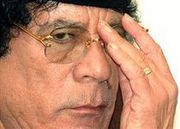 Reports are coming in that
French jets have fired the first shots in the UN-supported intervention in Libya. The coming conflict will determine, in the short term, whether the Gaddafi regime is toppled and, in the longer
term, whether the international community rediscovers its appetite for intervention which had been so diminished by the controversies over Iraq and the difficulties of the Afghan mission.
Reports are coming in that
French jets have fired the first shots in the UN-supported intervention in Libya. The coming conflict will determine, in the short term, whether the Gaddafi regime is toppled and, in the longer
term, whether the international community rediscovers its appetite for intervention which had been so diminished by the controversies over Iraq and the difficulties of the Afghan mission.
That there is intervention at all in Libya is down in no small part to David Cameron and William Hague. Hague played a key role in ensuring that Arab countries were prepared to commit to putting planes in the air in this operation, something that was crucial to moving the vacillating Obama off the fence. Indeed, I am told by British government sources that two to four Arab nations will now take part. By moving the American position, Cameron and Hague have demonstrated—as Blair did over Kosovo—that despite being the junior partner in the special relationship, Britain can, with bold leadership, nudge Washington into changing policy.
Hague was also key to keeping the Lebanese on board when the resolution proposing a no fly zone became a more robust one promising all necessary means. It is worth noting that the resolution does not rule out ground forces. What it does rule out is an occupying force but that is distinct from the use of ground forces for a specific tactical objective.
The Libyan crisis has shown why an EU foreign policy is such a risible idea, EU members very rarely take the same position on a matter as demonstrated by the German abstention in the Security Council and the failure of the EU to back a no fly zone. All of which, makes it rather odd that Cathy Ashton, the EU’s ineffective foreign policy commissioner, attended today’s Paris summit.







Comments